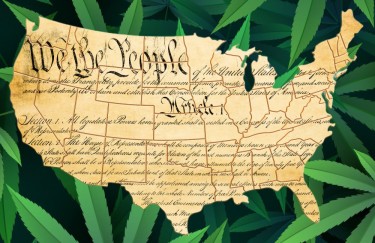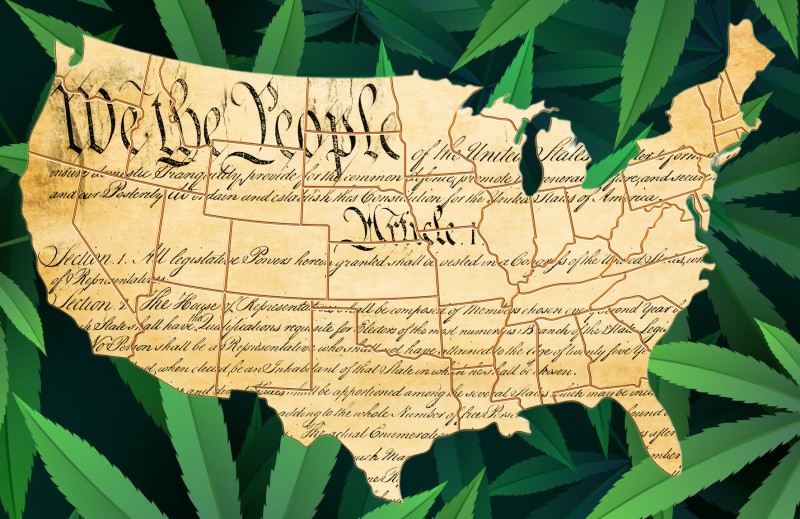
A coalition of marijuana businesses, supported by influential law firms, has initiated a lawsuit aimed at challenging the federal government's continued prohibition of cannabis. These companies argue that upholding cannabis prohibition in states with legalized cannabis markets is unconstitutional, resulting in public safety concerns and preventing these businesses from accessing essential financial services and tax deductions. The lawsuit, filed in the U.S. District Court for the District of Massachusetts, is led by multi-state operator Verano Holdings Corp., Massachusetts-based cannabis businesses Canna Provisions and Wiseacre Farm, and Treevit CEO Gyasi Sellers. Prominent marijuana industry players, including Ascend Wellness Holdings, TerrAscend, Green Thumb Industries, Eminence Capital, and Poseidon Investment Management back them. The legal representation is provided by law firms Boies Schiller Flexner and Lesser, Newman, Aleo & Nasser LLP.
Challenging Constitutional Grounds
The lawsuit takes a bold stance by challenging the constitutionality of maintaining federal cannabis prohibition in states with legalized marijuana markets. It argues that the federal government's initial justifications for banning intrastate marijuana commerce under the Controlled Substances Act (CSA) are no longer valid. The complaint asserts that Congress's original intent behind the CSA was to eliminate interstate commerce related to cannabis. However, as an increasing number of states have embraced cannabis legalization, the federal government's focus has shifted. They have, in essence, abandoned their mission to eradicate intrastate marijuana commerce.
The lawsuit contends that this outdated, inconsistent, and irrational approach to marijuana regulation provides no constitutional basis for Congress to continue regulating intrastate marijuana commerce. The legal action builds on the assertion that Congress has authority over interstate commerce but lacks the general police power to regulate marijuana grown, transported, and distributed intrastate. It invokes the Commerce Clause and the Necessary and Proper Clause of the Constitution to argue that Congress's overreach violates state sovereignty.
This section of the lawsuit highlights the evolving landscape of marijuana legislation, which has seen Congress annually renew an appropriations rider that prevents the Justice Department from interfering in state medical cannabis programs. Additionally, attorneys general from various administrations have expressed disinterest in criminalising marijuana-related activities sanctioned by the states. The lawsuit characterizes the federal government's approach as inconsistent, patchy, and inappropriate, ultimately challenging its legitimacy in continuing to treat cannabis as a federal crime.
These legal arguments align with the sentiments expressed by Supreme Court Justice Clarence Thomas, who, in 2021, criticized the contradictory and unstable state-federal marijuana policy conflicts and the federal government's "half-in, half-out" stance on the matter. This part of the lawsuit seeks to bring clarity to the constitutional framework surrounding cannabis regulation and push for a reconsideration of the federal government's role in intrastate marijuana commerce.
Financial Implications and Public Safety Risks
The second crucial aspect of this lawsuit underscores the significant financial challenges faced by state-regulated marijuana businesses due to federal prohibition. The difficulty of small enterprises to obtain crucial financial services, credit cards, and federal tax deductions under IRS rule 280E is at the heart of the problem. This financial exclusion has far-reaching implications for enterprises, public safety and consumer choice.
The lawsuit contends that the lack of access to traditional banking services forces state-regulated marijuana businesses to rely heavily on cash transactions. This practice poses serious public safety risks. State-regulated marijuana dispensaries have become targets for robberies due to their cash-centric operations. These incidents result in higher operating costs for these businesses and reduce consumer participation in state-regulated marijuana markets. This, in turn, leads to reduced innovation and a limited range of choices for consumers in the cannabis industry.
The financial burdens imposed on these businesses are further exacerbated by the federal government's discriminatory tax policies. The inability to claim federal tax deductions available to other industries under IRS code 280E places an additional financial strain on state-legal cannabis businesses.
In essence, this section of the lawsuit highlights the practical and real-world implications of federal cannabis prohibition. It illustrates how these financial challenges not only hamper the growth and viability of the cannabis industry but also affect public safety, as the cash-based nature of these businesses creates an environment conducive to crime. The plaintiffs argue that the federal government's continued prohibition perpetuates these issues and serves as a roadblock to the responsible, regulated growth of state-legal marijuana businesses.
Impacts on State Sovereignty and Low-Income Communities
Another critical dimension of the lawsuit delves into how the federal prohibition of cannabis intrastate commerce affects state sovereignty and, in particular, low-income communities. The lawsuit contends that the federal government's stance is detrimental to states, their citizens, and, importantly, the plaintiffs involved.
The federal government portrays the prohibition on the intrastate sale of marijuana as an "unconstitutional imposition on state sovereignty." It contends that although Congress can control marijuana's interstate commerce, it cannot control how the drug is grown, distributed, carried, or sold inside state lines. In this part of the lawsuit, the federal government's overreach is highlighted, and its right to meddle in state-regulated marijuana markets is contested.
The impact on low-income areas is also underlined. One significant consequence of the federal prohibition is that it precludes cannabis products from being delivered to public housing units in states where cannabis is allowed. This approach is portrayed as harmful to both states and their inhabitants, particularly those from economically disadvantaged backgrounds.
The lawsuit underscores how these consequences disproportionately affect marginalised communities and hinder the growth of small, state-legal marijuana businesses. It argues that the federal government's continued prohibition perpetuates inequality and restricts access to essential financial support and regulatory advantages.
Ultimately, this section of the lawsuit underscores the broader social and economic implications of the federal ban on intrastate cannabis commerce, calling for a reconsideration of this policy to ensure equitable access to cannabis products and the promotion of responsible, regulated markets.
Bottom Line
The lawsuit filed by a coalition of marijuana businesses challenging the federal prohibition of cannabis in states with legalized markets is a pivotal legal battle with the potential to reshape the cannabis industry and state-federal relations. Their arguments, spanning from the constitutionality of federal intervention to practical implications for businesses and marginalized communities, highlight the complex and evolving nature of cannabis regulation in the United States. With influential law firms and industry players backing their cause, this lawsuit represents a determined effort to address the disparities and inconsistencies perpetuated by federal cannabis prohibition, ultimately seeking to ensure equitable access to cannabis products and promote responsible, regulated markets while challenging the federal government's historical stance on intrastate marijuana commerce.







